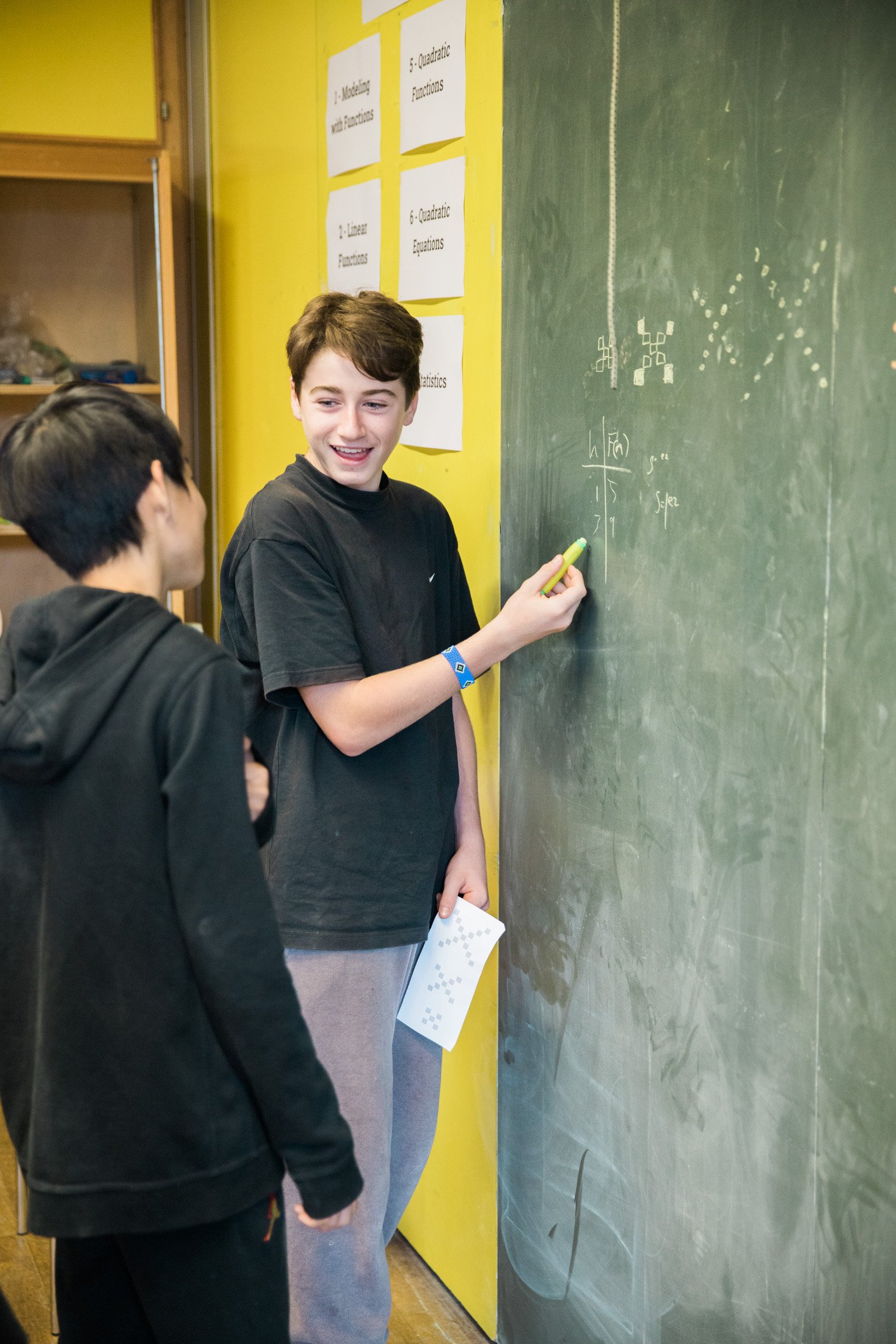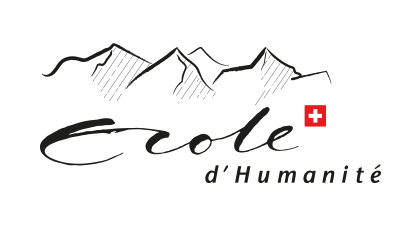
WHAT WE LEARN
Academic Courses at the Ecole d’Humanité
The Ecole d’Humanité offers a rich selection of academic courses structured around engaging themes. Here’s a taste of the courses we are offering in the US system this term.
US Academic Courses
english: World Mythology, Part II
This course is a continuation of a popular mythology course which was offered here in winter term. In this globally inclusive course, we enjoy learning lessons about life and culture from these ancient tales. Categories of stories that we will cover in the summer term include Legends of Robin Hood, Legends of King Arthur, Norse Mythology, Native American Mythology, and Celtic Mythology. In class, we enjoy these stories in a variety of ways. One of the most popular is through play scripts where students take turns reading parts of a script story presenting an adapted version of the ancient story. We also watch occasional videos of these stories for later discussion, as well as create art and even practice writing messages in ancient languages such as cuneiform.
Art: Creating in Nature
In this class we will explore different approaches to the combination of art and nature. Using various mediums we will draw inspiration from our local landscape as we explore different artistic techniques. In our sketchbooks, we will create watercolor depictions of our alpine environment. We will make use of natural materials as we create works of landart. We will explore photography, documenting how the progression of the spring season changes our surroundings. In class, we will learn about artists who have also drawn inspiration from land and the variety of techniques they have used to create art. We draw on some examples of unconventional works, and engage in discussions about what is art, develop our points of view and learn to make informed statements on this topic.
Social Science: Colonialism
What’s Yours Is Mine: The Past, Present, and Future of Colonialism. When groups of people move to where other people already live, what happens? Through analyses of past and contemporary colonial case studies, including reading Chinua Achebe’s Things Fall Apart, students will understand the history of colonialism and its present-day impacts. The class will culminate with a series of presentations of each student’s own colonial case study and a summary of the group’s findings including recommendations for the future.
Science: Science of Photography
As Kyle Maclachlan explained in the surrealist television soap opera, Twin Peaks, dreams are formed by "...acetylcholine neurons fir[ing] high voltage impulses into the forebrain. The impulses become pictures, the pictures become your dream. But no one knows why we choose these particular pictures." In this multidisciplinary course, we will explore the processes behind creating images in black and white photography. This will include investigating the optics of the camera, the principles of light and the chemistry of photographic development. Through these investigations, you will develop a portfolio during this course that analyzes specific points of the photographic process. However much like what we know about dreams, it is up to you to decide what images you want to choose. It is preferred that students have some science and/or darkroom experience.
IT: Computer Programming
This course is for beginners in programming who are interested in the very visual interface of Javascript. We will have six projects (one each week) in this individualized curriculum, where students set the pace of their learning. Not only will you learn how to code, but we will also talk about the elements of design and what makes for a pleasing program.
Pre-AP® Art
To get a better understanding of what AP® Art is, we will start each class by watching the short videos provided on the AP Art classroom website and discuss them. The rest of the hour will be dedicated to creating art and for each student to find their own area of visual research. AP® Art is about entering a process, finding something you are truly interested in, to research about, experiment with in order to visually convey an idea, a feeling or whatever you might like to express.
Dance Repertoire
How can you tell a story through dance? How do we communicate our ideas through dance? This course is designed to provide you with the skill to create your own choreography. You will learn different composition techniques to express your message through dance.
The creative process is documented in a journal and shared with the class on a regular basis. Your choreography will be presented in an Andacht at the end of the summer term. Each student will also research a dance form or dancer/choreographer and present what they have learnt to the rest of the class.
Foreign Language: Deafness/ ASL
This course will introduce you to the science of how hearing works, the parts and functions of the ear, and the different types of hearing loss. You will learn some American Sign Language (ASL) vocabulary and grammar including the manual alphabet with an interactive hands-on experience. You will explore aspects of Deaf culture in addition to discussing and thinking critically about hearing loss as it exists on a spectrum. Students will be invited to share their knowledge throughout the course in a variety of ways, including but not limited to expressive and receptive use of ASL.
Art: Music Production
In this course the student learnt how to record and produce professional sounding music, in different genres, using the Digital Audio Workstation Ableton Live to create recordings. They learnt how to create a short film soundtrack and sync it with the video. They completed additional projects beginning at the pre-production stage through the recording, mixing, and mastering stages. The students were introduced to some basic concepts of music theory.
Geometry
The word geometry comes from Greek and means “measuring the world.” Students will measure the world around them by exploring relationships between points, lines, surfaces, and solids including congruence, rigid motion, similarity, and right triangle trigonometry. Many concepts will be analyzed both geometrically and algebraically and will form a foundation for success in Algebra II. Students must have completed Algebra I or have approval from the math department before enrolling in Geometry.
English: Anarchism and Literature
A course exploring anarchist thought and practice, and its expression in literature and art. What is anarchy? Is it destructive or constructive? What does it mean to practice anarchy in the 21st century? What does it mean to live ungoverned, and why do people fear this autonomy? We will read William Blake, Emma Goldman, Ursula Le Guin, and Scott Branson’s Practical Anarchism.
Science: Dinosaurs
Dr. Ichiro Serizawa, played by Ken Watanabe in the 2014 Godzilla remake, bluntly explains “The arrogance of men is thinking nature is in their control and not the other way around”. In this course, we will explore how nature controls the formation and development of life through the process of evolution. We will use the rise and fall of the dinosaurs as a lens to explore this phenomenon. This will include looking at adaptation through the geological timeline, natural selection as based off of geography and how extinction influences speciation. Throughout the term, you will work on an individual research project based off of a dinosaur of your choosing and reading the popular science book “Why Evolution is True” by Jerry Coyne. It is preferred that students have some science experience.
Social Science: Cinema, Culture, and Power
Cinema and the entertainment industry have influenced, reflected, and shaped political landscapes, societal beliefs, and historical events. We will analyze and discuss films, learn to create video essays, and discuss the powerful role media and entertainment play in society. Topics will include the impact of blockbuster franchises like Marvel on societal norms, political satire, historical fiction and more.
Ceramics
This course is designed for students who have some experience with ceramics, and are interested in spending lots of time both in- and out of class expanding their knowledge and honing their skills. You will work on a series of four or five specific projects that will incorporate a variety of hand-building and wheel techniques. Each project will have its own unique requirements for planning, design, construction, and function. Beyond that, you will have autonomy to incorporate your own creative interpretations and expressions into your end-products. Some techniques we will explore include sculpture, slip-casting, and lidded vessels. You will learn from each other, share your successes and failures, as well as document your individual learning through pictures, video, and writing. The final collections and written work will be displayed in an exhibition for Summerfest.
Co-Curricular Courses
Our co-curricular courses are offered in English and in German, and cover a wide array of topics.
